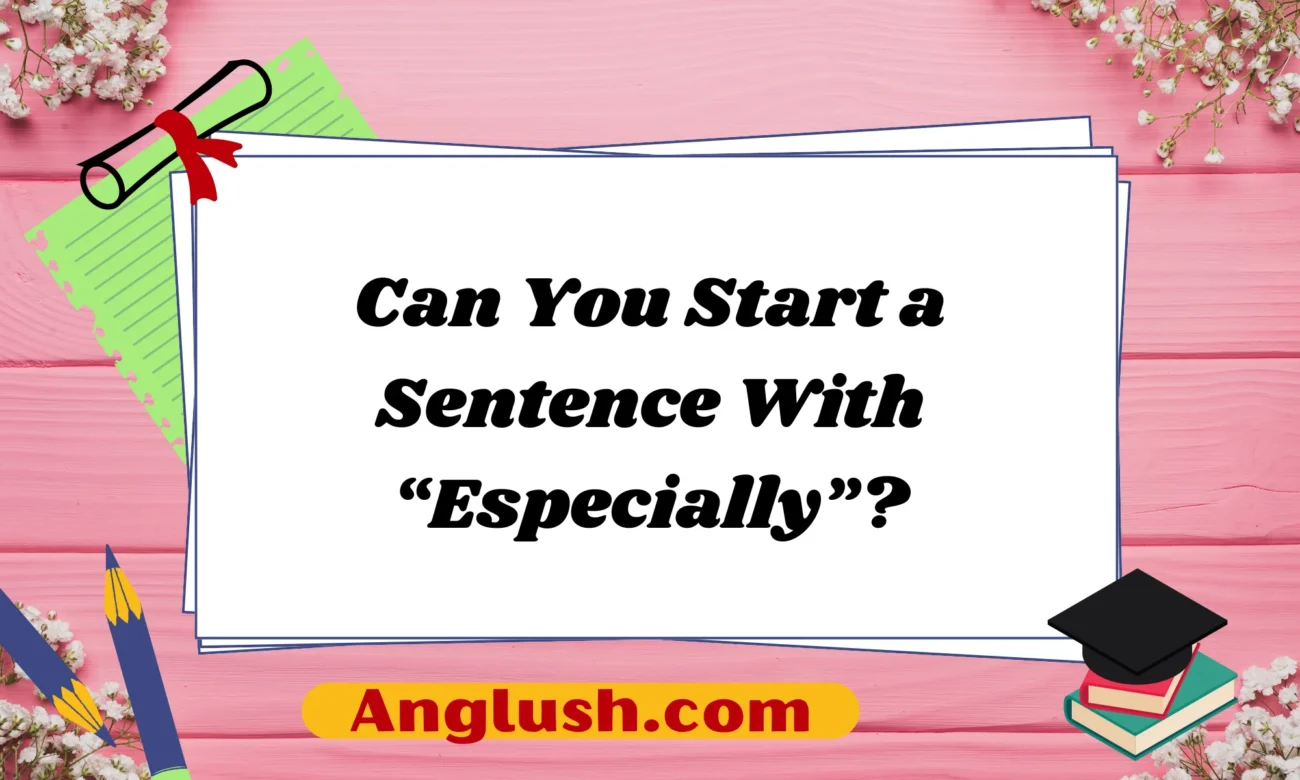Introduction
The English language offers a wide range of flexibility, allowing for creative expression in both spoken and written forms. One question that often arises is whether it’s grammatically correct to start a sentence with the word “especially.” While some grammar purists may advise against it, the reality is that “especially” can be used at the beginning of a sentence when structured correctly.
This article will explore the grammatical correctness of starting a sentence with “especially,” its appropriate usage in different contexts, and alternative ways to convey emphasis in both formal and informal writing. We will also provide 10 practical texting examples that illustrate the use of “especially” in everyday communication.
Understanding the Word “Especially”
The word “especially” is an adverb that emphasizes a particular part of a sentence. It is used to highlight something as being more important, relevant, or significant in comparison to other elements.
For example:
✔️ I love Italian food, especially pasta.
In this sentence, “especially” emphasizes pasta as the specific type of Italian food that is particularly loved.
When starting a sentence with “especially,” it often requires careful structuring to ensure clarity and smooth flow.
Is It Correct to Start a Sentence With “Especially”?
Yes, you can start a sentence with “especially,” but it must be structured properly. The main concern is avoiding sentence fragments or awkward phrasing.
Here are some correct examples:
✔️ Especially in winter, the city looks magical with snow-covered streets.
✔️ Especially for beginners, learning a new language can be challenging.
✔️ Especially after a long day, a hot bath feels relaxing.
In each case, the sentence remains complete and clear, making the usage of “especially” acceptable.
However, incorrect usage can lead to grammatical errors:
❌ Especially, I love chocolate ice cream. (This is awkward and unclear.)
❌ Especially is my favorite word. (This does not make sense.)
When Should You Avoid Starting a Sentence With “Especially”?
While it is grammatically correct in many cases, starting a sentence with “especially” may sound awkward or unnatural in formal writing. In highly professional or academic settings, it’s often better to restructure the sentence for better clarity and readability.
For example:
❌ Especially in business, clear communication is important.
✔️ Clear communication is especially important in business.
Restructuring the sentence often results in better readability and a more natural flow.
Alternative Ways to Start a Sentence Instead of “Especially”
If you’re unsure about starting a sentence with “especially,” consider these alternatives that work well in different contexts:
1. In Particular
✔️ In particular, customer service plays a crucial role in business success.
2. Particularly
✔️ Particularly during the holidays, shopping malls become extremely crowded.
3. Notably
✔️ Notably, the company has improved its sustainability efforts this year.
4. Above All
✔️ Above all, honesty is essential in any relationship.
5. Most Importantly
✔️ Most importantly, staying consistent is the key to achieving long-term success.
6. To Be Specific
✔️ To be specific, the software update will enhance security features.
7. Especially When
✔️ Especially when it’s raining, driving requires extra caution.
8. More Than Anything
✔️ More than anything, she values her family’s happiness.
9. Significantly
✔️ Significantly, the new policy has reduced customer complaints.
10. To Emphasize
✔️ To emphasize, teamwork is crucial for a project’s success.
Formal vs. Informal Usage of “Especially”
The word “especially” is versatile and can be used in both formal and informal settings. However, the placement and tone of the sentence determine how professional it sounds.
✅ Formal Usage
✔️ Especially in legal matters, precision in wording is crucial.
✔️ Particularly in academic writing, clarity and structure are important.
✅ Informal Usage
✔️ Especially on weekends, I love sleeping in late!
✔️ I love summer, especially beach vacations!
In formal writing, it’s often better to use “particularly” or “notably” instead of “especially” at the beginning of a sentence.
10 Practical Texting Examples Using “Especially”
When texting or messaging, “especially” can be used in a casual, friendly, or even professional manner. Here are 10 examples:
1️⃣ Especially after a long day, I just want to relax and watch Netflix!
2️⃣ I love desserts, especially chocolate cake! 😍
3️⃣ Especially in traffic, patience is key.
4️⃣ This song reminds me of summer, especially our road trips! 🚗
5️⃣ Especially when I’m busy, I forget to check my messages. Sorry! 😅
6️⃣ I miss our weekend hangouts, especially those late-night talks.
7️⃣ Especially during winter, I crave hot chocolate. ☕
8️⃣ Especially now, we need to focus on our goals.
9️⃣ I love traveling, especially to tropical places! 🌴
🔟 Especially after a workout, a smoothie tastes amazing!
These examples show how naturally “especially” fits into everyday conversations.
Final Thoughts
So, can you start a sentence with “especially”? Yes, you can—but with caution. While grammatically acceptable, it’s often better suited for informal or conversational writing. In formal settings, consider restructuring your sentence or using alternatives like “particularly” or “notably.”
By understanding the nuances of tone and context, you can effectively use “especially” to add emphasis and clarity to your writing. Whether you’re composing a professional email, an academic paper, or a casual text message, choosing the right words ensures your message is clear and impactful.

